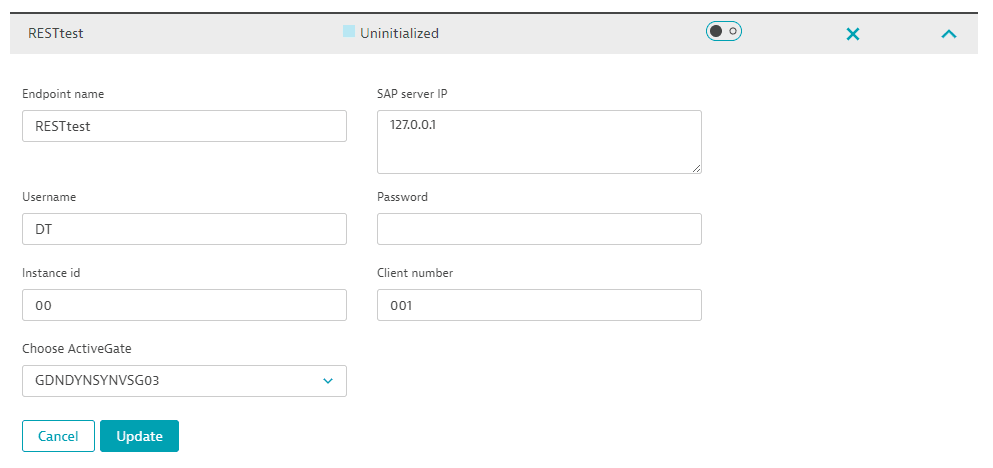Plugins API - POST a new plugin's endpoint
- Reference
- Published Jun 07, 2019
Creates a new endpoint for the specified ActiveGate plugin.
The request consumes and produces an application/json payload.
| POST | SaaS | https://{your-environment-id}.live.dynatrace.com/api/config/v1/plugins/{id}/endpoints |
| POST | Environment ActiveGate | https://{your-activegate-domain}:9999/e/{your-environment-id}/api/config/v1/plugins/{id}/endpoints |
Authentication
To execute this request, you need an access token with WriteConfig scope.
To learn how to obtain and use it, see Tokens and authentication.
Parameters
| Parameter | Type | Description | In | Required |
|---|---|---|---|---|
| id | string | The ID of the plugin where you want to create an endpoint. | path | Required |
| body | Remote | The JSON body of the request. Contains parameters of the new plugin endpoint. | body | Optional |
Request body objects
The RemotePluginEndpoint object
Configuration of a plugin endpoint.
| Element | Type | Description | Required |
|---|---|---|---|
| activeGatePluginModule | Entity | The short representation of a Dynatrace entity. | Required |
| enabled | boolean | The endpoint is enabled ( | Optional |
| id | string | The ID of the endpoint. | Optional |
| name | string | The name of the endpoint, displayed in Dynatrace. | Optional |
| pluginId | string | The ID of the plugin to which the endpoint belongs. | Optional |
| properties | object | The list of endpoint parameters. Each parameter is a property-value pair. | Optional |
The EntityShortRepresentation object
The short representation of a Dynatrace entity.
| Element | Type | Description | Required |
|---|---|---|---|
| description | string | A short description of the Dynatrace entity. | Optional |
| id | string | The ID of the Dynatrace entity. | Required |
| name | string | The name of the Dynatrace entity. | Optional |
Request body JSON model
This is a model of the request body, showing the possible elements. It has to be adjusted for usage in an actual request.
{"activeGatePluginModule": {"id": "-8844900174269363000"},"enabled": true,"id": "-2183662974968812535","name": "Demo endpoint","pluginId": "custom.remote.python.demo","properties": {"dropdownProperty": "two","password": "","serverIp": "127.0.0.1","username": "dynatrace"}}
Response
Response codes
| Code | Type | Description |
|---|---|---|
| 201 | Entity | Success. The plugin endpoint has been created. Response contains the ID of the new endpoint. |
| 400 | Error | Failed. The input is invalid. |
Response body objects
The EntityShortRepresentation object
The short representation of a Dynatrace entity.
| Element | Type | Description |
|---|---|---|
| description | string | A short description of the Dynatrace entity. |
| id | string | The ID of the Dynatrace entity. |
| name | string | The name of the Dynatrace entity. |
The ErrorEnvelope object
| Element | Type | Description |
|---|---|---|
| error | Error | - |
The Error object
| Element | Type | Description |
|---|---|---|
| code | integer | The HTTP status code |
| constraintViolations | Constraint | A list of constraint violations |
| message | string | The error message |
The ConstraintViolation object
A list of constraint violations
| Element | Type | Description |
|---|---|---|
| location | string | - |
| message | string | - |
| parameterLocation | string | -The element can hold these values
|
| path | string | - |
Response body JSON models
{"description": "Dynatrace entity for the REST API example","id": "6a98d7bc-abb9-44f8-ae6a-73e68e71812a","name": "Dynatrace entity"}
{"error": {"code": 1,"constraintViolations": [{"location": "string","message": "string","parameterLocation": "HEADER","path": "string"}],"message": "string"}}
Validate payload
We recommend that you validate the payload before submitting it with an actual request. A response code of 204 indicates a valid payload.
The request consumes an application/json payload.
| POST | SaaS | https://{your-environment-id}.live.dynatrace.com/api/config/v1/plugins/{id}/endpoints/validator |
| POST | Environment ActiveGate | https://{your-activegate-domain}:9999/e/{your-environment-id}/api/config/v1/plugins/{id}/endpoints/validator |
Authentication
To execute this request, you need an access token with WriteConfig scope.
To learn how to obtain and use it, see Tokens and authentication.
Response
Response codes
| Code | Type | Description |
|---|---|---|
| 204 | - | Validated. The submitted configuration is valid. Response doesn't have a body. |
| 400 | Error | Failed. The input is invalid. |
Response body objects
The ErrorEnvelope object
| Element | Type | Description |
|---|---|---|
| error | Error | - |
The Error object
| Element | Type | Description |
|---|---|---|
| code | integer | The HTTP status code |
| constraintViolations | Constraint | A list of constraint violations |
| message | string | The error message |
The ConstraintViolation object
A list of constraint violations
| Element | Type | Description |
|---|---|---|
| location | string | - |
| message | string | - |
| parameterLocation | string | -The element can hold these values
|
| path | string | - |
Response body JSON models
{"error": {"code": 1,"constraintViolations": [{"location": "string","message": "string","parameterLocation": "HEADER","path": "string"}],"message": "string"}}
Example
In this example, the request creates a new endpoint for the SAP plugin which has the ID of custom.remote.python.sap.
The API token is passed in the Authorization header.
Curl
curl -X POST \https://mySampleEnv.live.dynatrace.com/api/config/v1/plugins/custom.remote.python.sap/endpoints \-H 'Authorization: Api-Token dt0c01.abc123.abcdefjhij1234567890' \-H 'Content-Type: application/json' \-d '{"pluginId": "custom.remote.python.sap","name": "RESTtest","enabled": false,"properties": {"clientno": "001","serverIp": "127.0.0.1","password": "","instance": "00","username": "DT"},"activeGatePluginModule": {"id": "1768386982494938781"}}'
Request URL
https://mySampleEnv.live.dynatrace.com/api/config/v1/plugins/custom.remote.python.sap/endpoints
Request body
{"pluginId": "custom.remote.python.sap","name": "RESTtest","enabled": false,"properties": {"clientno": "001","serverIp": "192.168.0.1","password": "","instance": "00","username": "DT"},"activeGatePluginModule": {"id": "1768386982494938781"}}
Response body
{"id": "8757307336635955682"}
Response code
201
Result
The new endpoint looks like this in the UI:
